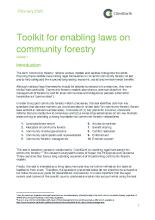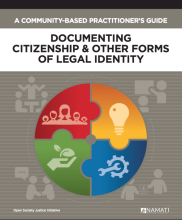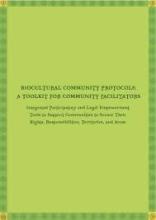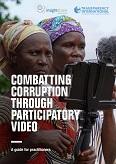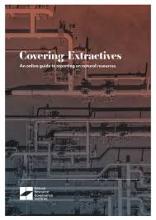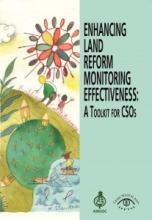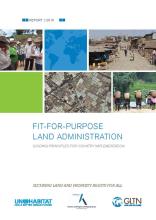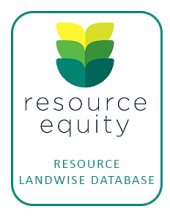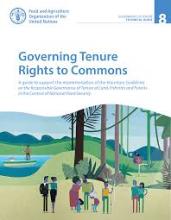Resources for Advocacy
Toolkit for enabling laws on community forestry
This toolkit identifies common key questions that decision-makers can use to develop or review laws on community forestry. It consists of key points for inclusive, consistent reforms that are conductive to consensus and a series of questionnaires on ten key thematic areas aiming at providing a strong foundation for community forestry-related laws: Land and forest tenure, Allocation of community forests, Community internal governance, Community participation and representation, Community forestry management, Access to markets, Benefit sharing, Conflict resolution, Enforcement and External support.
A Community-Based Practitioner’s Guide: Documenting Citizenship and Other Forms of Legal Identity
This guide provides step-by-step instructions on establishing and operating a paralegal or other community-based program to help people obtain legal identity documents. It is primarily for people designing and managing community-based paralegal projects to help clients access documentary proof of citizenship and other forms of proof of legal identity, such as birth certificates. However, it will also be useful to those undertaking legal aid, litigation, and non-litigation advocacy work, as the issues that it seeks to address frequently lie at the intersection of laws and how they are applied in practice.
Biocultural Community Protocols: A Toolkit for Community Facilitators
The toolkit is intended to support communities to secure their rights and responsibilities and strengthen customary ways of life and stewardship of their territories and areas. It is directed primarily towards facilitators from the communities themselves or from supporting organizations with whom they have long-standing and positive relationships.
Combatting corruption through participatory video: A guide for practitioners
This guide was developed to assist participatory video practitioners to undertake corruption-focussed projects and to encourage its uptake within the anti-corruption movement worldwide. Participatory video is a form of community media that engages citizens in the processes of investigating and documenting their circumstances, devising solutions and advocating for change. The videos produced can be used to establish communications between citizens and decision-makers, opening up new spaces for dialogue and opportunities for increased social accountability.
Covering Extractives An online guide to reporting on natural resources
This practical guide aims to help journalists in resource-rich countries identify, analyze and report on issues in the extractive industries. It offers tools for building convincing stories, research leads, and inspiration from experienced reporters.
Enhancing Land Reform Monitoring Effectiveness: A Toolkit for CSOs
This framework aims to help civil society organisations to monitor land reforms. It identifies indicators on outcomes on land tenure and access to land that will help CSOs critically examine whether the rural poor’s land tenure is more secure, and whether their access to land has been enhanced.
Fit-for-Purpose Land Administration: Guiding Principles for Country Implementation
The guide proposes guiding principles to build Fit-For-Purpose land administration systems in order to deliver benefits, including secure tenure rights, to a wide range of stakeholders. It provides structured guidance on building the spatial, legal and institutional frameworks in support of designing country-specific strategies for implementing FFP land administration. It contains the analysis and operational advisory guidelines to implement the approach.
Gender-Responsive Work on Land and Corruption: A practical guide - Gender-Responsive Work on Land and Corruption
This guide will help organisations understand the differences in impacts of land corruption on men and women, in order to design advocacy programmes that are both inclusive and effective.
Governing land for women and men: A technical guide to support the achievement of responsible gender-equitable governance of land tenure
The guide focuses on equity and on how land tenure can be governed in ways that address the different needs and priorities of women and men. It moves away from long-standing debates about gender equality in access to land, towards the mainstreaming of gender issues to achieve more gender-equitable participation in the processes and institutions that underlie all decision-making about land.
Governing Tenure Rights to Commons
This guide aims to support states, community-based organizations, civil society organizations, the private sector and other relevant actors, to take proactive measures to implement the standards and recommendations of the Voluntary Guidelines on the Responsible Governance of Tenure (VGGT). The goal is to achieve legal recognition and protection of tenure rights to commons and community-based governance structures.


